
In 2018, Australia entirely revamped its espionage offence framework to better address the threat of contemporary espionage. Reconnaissance today targets a vast array of details from several people (not just those in intelligence or the armed forces). It can be engaged in by any kind of foreign power, not just those considered to be “enemies”, and is progressively conducted using cyber-espionage.
The similar offense of “preparing for terrorism” has a maximum charge of life in prison. It has been the structure of a number of successful prosecutions in which defendants have been punished to really extensive durations of imprisonment.
Since “getting ready for reconnaissance” is a standalone offence, the basic inchoate offences in the Wrongdoer Code can “connect” to the preparatory offense to develop “pre-pre-crimes”. As an example, an individual can be charged with “conspiracy theory to prepare for espionage”.
It is affirmed the pair planned to provide the info to Russian authorities. The Korolevs have actually been billed with “preparing for an espionage offense”, which might see them behind bars for approximately 15 years.
Cops affirm Kira Korolev, an Australian Defence Force (ADF) military personal, embarked on undeclared traveling to Russia while on long-term leave. While there, she apparently advised her other half, Igor Korolev, to go to her job account and gain access to defence pressure product to send to her.
This short article was composed in Sarah Kendall’s personal capacity as an Adjunct Research Other at the College of Queensland College of Law. It does not show the sights of any organisation with which the writer is associated.
“Planning for espionage” is a wide offence that makes it a crime for a person to participate in any conduct. However, in doing so, they should intend to prepare for an underlying reconnaissance offence. An individual encounters up to 15 years in jail if found guilty.
Numerous of Australia’s espionage offenses can use to the genuine conduct of academics, resources or journalists. Even where the person’s conduct is much more clearly dubious, there are uncertainties regarding how the offenses operate.
The Korolev case will certainly be among the most significant national security cases to view. If it proceeds to trial, it will certainly offer a chance to clear up the operation of Australia’s 2018 reconnaissance offenses and settle a few of the crucial problems with the offenses.
This is a considerable instance and one worth enjoying. Not just is it the very first time that someone has actually been charged with an espionage offense given that brand-new legislations were presented in 2018, yet it is only one of a handful of known espionage costs that have actually ever been laid in Australia. The Korolevs have likewise been billed with a standalone “preparatory” nationwide safety and security offense, which only existed in the terrorism context prior to 2018.
In R v Lappas, a Defence Knowledge Organisation worker was convicted of the 1914 offense of “making a sketch, strategy, design or note that may or was planned to be valuable to an adversary”. He had passed annotated files that exposed sources of ongoing intelligence to a third party, who was to market them on a foreign power. The tried sales were unsuccessful.
Standalone preparatory offenses such as preparing for reconnaissance or terrorism aim to prevent damage from occurring to begin with. They increase the criminal law past its traditional bounds since they punish individuals for criminal offenses that may happen in the future, not for substantive criminal offenses that have already been dedicated. Because of this, they can be taken into consideration “pre-crimes”.
Authorities are still exploring whether the couple did in truth share details with Russian authorities. If they did, police have verified that further costs could be laid. This includes fees for underlying reconnaissance offences, which bring maximum fines of 15 years to life behind bars.
Preparatory criminal offenses are a sort of “inchoate” offense: an offence relating to a substantive crime that has not been dedicated. Other inchoate offences in the Commonwealth Crook Code include effort, conspiracy and incitement. Each inchoate offence has various elements that need to be verified.
These offences can be much easier to show than both the primary offence and the substantive offense, yet offenders can still face years behind bars. For instance, the offence of “conspiring to plan for terrorism” has actually been consistently utilized in the terrorism context in Australia and has actually sustained sentences of approximately 28 years in prison.
Several vital terms and phrases utilized in the reconnaissance offences are not plainly specified or are defined with significant breadth. This produces offences that are vague and have the possible to be inappropriately wide-reaching.
In addition to clarifying the procedure of the regulation, the Korolev instance signs up with just a handful of other known cases in Australia in which an individual has been charged with snooping. So maintain your eyes peeled off – you’ll be viewing background planned.
Not only is it the first time that a person has been billed with a reconnaissance offense considering that new laws were presented in 2018, however it is only one of a handful of well-known espionage costs that have actually ever been laid in Australia. In 2018, Australia completely revamped its reconnaissance offense structure to much better address the risk of modern espionage.”Preparing for reconnaissance” is a broad offence that makes it a criminal activity for an individual to engage in any type of conduct. Standalone preparatory offenses such as preparing for espionage or terrorism objective to protect against damage from occurring in the very first place. Primary crimes are a type of “inchoate” offense: an offense relating to a substantive crime that has not been dedicated.
1 Australia Senator Linda2 offense
3 Reconnaissance Act
4 States Espionage Act
« Climate in the courtroom: all sides are using ‘green lawfare’, and it’s good for democracyUndermining Indigenous Peoples’ Rights: The Ongoing Struggle for Recognition in UN Environmental Agreements »
